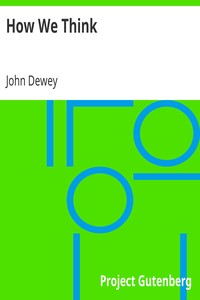How We Think by John Dewey
"How We Think" by John Dewey is an educational treatise written in the early 20th century. The work explores the importance of developing reflective thinking and outlines methods for effectively training thought processes in educational contexts. With an emphasis on the relationship between scientific inquiry and education, Dewey argues that fostering a scientific attitude in students is essential for promoting individual happiness and reducing social waste. The opening of the book presents
a preface that highlights the challenges faced by educators, such as an overabundance of subjects and various teaching materials leading to distraction. Dewey asserts that a guiding principle—the scientific attitude—could bring unity and purpose to educational endeavors. He communicates the conviction that children possess a natural curiosity and capacity for scientific inquiry, which education should harness. The initial chapters also introduce key concepts regarding the nature of thought and the distinctions between various types of thinking, setting the stage for deeper exploration into the methods for training thought throughout the remainder of the work. (This is an automatically generated summary.)
Read or download for free
| How to read | Url | Size | |||
|---|---|---|---|---|---|
| Read now! | https://www.gutenberg.org/ebooks/37423.html.images | 487 kB | |||
| EPUB3 (E-readers incl. Send-to-Kindle) | https://www.gutenberg.org/ebooks/37423.epub3.images | 245 kB | |||
| EPUB (older E-readers) | https://www.gutenberg.org/ebooks/37423.epub.images | 253 kB | |||
| EPUB (no images, older E-readers) | https://www.gutenberg.org/ebooks/37423.epub.noimages | 251 kB | |||
| Kindle | https://www.gutenberg.org/ebooks/37423.kf8.images | 441 kB | |||
| older Kindles | https://www.gutenberg.org/ebooks/37423.kindle.images | 397 kB | |||
| Plain Text UTF-8 | https://www.gutenberg.org/ebooks/37423.txt.utf-8 | 421 kB | |||
| Download HTML (zip) | https://www.gutenberg.org/cache/epub/37423/pg37423-h.zip | 229 kB | |||
| There may be more files related to this item. | |||||
Similar Books
About this eBook
| Author | Dewey, John, 1859-1952 |
|---|---|
| Title | How We Think |
| Note | Wikipedia page about this book: https://en.wikipedia.org/wiki/How_We_Think |
| Note | Reading ease score: 45.6 (College-level). Difficult to read. |
| Credits |
Produced by Juliet Sutherland, Cathy Maxam and the Online Distributed Proofreading Team at http://www.pgdp.net |
| Language | English |
| LoC Class | BF: Philosophy, Psychology, Religion: Psychology, Philosophy, Psychoanalysis |
| Subject | Educational psychology |
| Subject | Thought and thinking |
| Category | Text |
| EBook-No. | 37423 |
| Release Date | Sep 14, 2011 |
| Copyright Status | Public domain in the USA. |
| Downloads | 3031 downloads in the last 30 days. |
| Project Gutenberg eBooks are always free! | |

